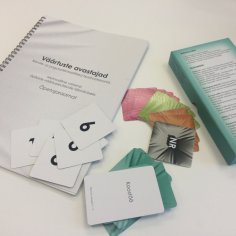Discovering Values – a values game for students
Discovering Values is a game targeted at students. It is a methodological tool for leading discussions on the topic of values.
In daily life, we face numerous situations where we have to choose between different values, and we often make this choice without even realising it. Similarly, we often leave the grounds for our choice without explanation and as a result our motives for a particular choice remain unclear for the others. Decisions and actions in different situations and in the conditions of a value conflict often depend on the ability to distinguish and evaluate different values. Conflicts characterised by a clash of different values, for example, the value of being loyal to a friend and the value of telling the truth, are not uncommon in the lives of children and adolescents. The game Discovering Values was created in order to give children the means to resolve such conflicts.
The game that combines an entertaining format with a serious content supports the development of students’ self-awareness, argumentation ability and empathy; it also helps to improve their functional literacy. The main part of the game consists of descriptions of various situations each of which contains a value dilemma, completed with descriptions of possible solutions. Each player chooses the option that he/she finds the most suitable and then tries to justify the choice to the other members of the team. As a result, players get the opportunity to see the situation from different points of view.
As the game is meant to facilitate discussion with the aim of forming, formulating and defending a personal position, there are no right or wrong solutions. Players choose between the options they consider more or less suitable but the decision about the suitability of an option remains a personal one. The game lifts daily choices to the level of values, helping to discover and reflect upon the values that are implicit in each choice. Through that, playing the game supports each student’s personal reflection upon values helping to achieve clarity in personally important values.
The situations described in the game are based on real life situations. In the spring of 2011, the Centre for Ethics of the University of Tartu in cooperation with the Estonian School Student Councils’ Union organised an essay competition “Value conflicts of my school day” for students. 56 fascinating works were received and the situations described in the essays were used when developing the game; the situations were also discussed in various seminars and training courses.
The values game for students was created by a working group at the Centre for Ethics: Edvin Aedma, Helina Harro, Halliki Harro-Loit, Nelli Jung, Gea Kangilaski, Pille Kõiv, Laura Lilles-Heinsar, Mari-Liisa Parder, Märt Põder, Heily Soosaar, Helena Stamberg, Egle Säre, Tiina Teppo, Katrin Velbaum.
The game for students is the most recent addition to the series of values games developed by the Centre for Ethics. The first game in the series, the Values Game for teachers, was developed in cooperation with Implement Inscape LLC.
You can read about the game for teachers here.
The development of the game for students was supported by the Ministry of Education and Research in the course of the national programme “The Values Development of the Estonian Society 2009–2013”.
Additional situations about refugees and migration

In the beginning of 2016, Tartu University Centre of Ethics in cooperation with Estonian Refugee Council created 12 additional situations for the game that focus on refugees and migration. The basis for additional situations are real life events that were gathered with the help of individuals and various organisations that are dealing with refugees. The game together with added refugee and migration themed situations is an innovative and interactive method meant to encourage critical and independent thinking, assessment of situations through various perspectives, and development of personal opinions as well as the ability to engage in a dialogue with others amongst youngsters.
Additional refugee- and migration-focused situations had been developed in cooperation between Estonian Refugee Council, Tartu University Centre of Ethics, Bully Free Education, and Estonian Ministry of Education and Research. In the framework of 2016 project “Preparing Estonian schools on the issue of refugees and supporting refugee children in education”, supported by United States Embassy in Estonia.
